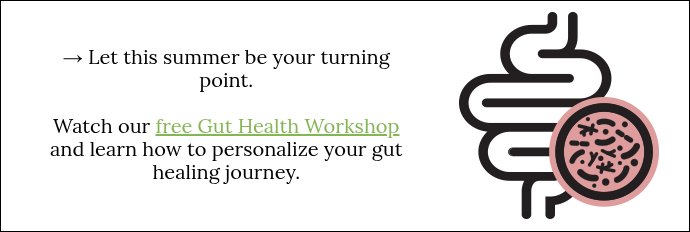Summer Is the Perfect Time to Heal Your Gut
Summer is known for beach days and backyard BBQs, but it also happens to be one of the most supportive seasons for gut healing. As we shift from the heavier, warming foods of winter to summer’s lighter, brighter fare, your body naturally syncs with a rhythm that favors repair, balance, and renewal.
Longer days mean more sunlight exposure, which boosts vitamin D and helps regulate your circadian rhythm, two critical players in digestive health. Seasonal produce offers diverse fibers and nutrients that nourish your microbiome. And the natural uptick in outdoor activity and stress-reducing downtime are both major contributors to better gut function.
From a functional medicine perspective, summer is the perfect opportunity to get to the root of digestive dysfunction. Its built-in cues: hydration, fresh food, sunlight, and movement, support detoxification and help rebuild gut lining integrity. Whether you're managing chronic bloating, sluggish digestion, or just want to optimize your health, summer creates the ideal environment for meaningful change.
Here’s how to lean into summer’s best gut-supportive foods (and what to skip).
What to Maximize:
Fermented Foods: Nature’s Probiotics
Embrace fermented favorites that thrive in warm weather. Sauerkraut and kimchi are rich in lactobacilli that boost digestive enzyme production and help crowd out harmful bacteria. Water kefir and kombucha (look for low-sugar options) offer probiotics and organic acids that help rebalance gut pH. Together, they support microbial diversity and strengthen gut resilience.
High-Fiber Produce: Microbiome Medicine
Berries like blueberries, raspberries, and blackberries offer prebiotic fibers and antioxidants that calm inflammation. Leafy greens such as arugula and summer lettuces provide folate and fiber for gut lining support. Zucchini and summer squash deliver gentle, digestible fiber to keep things moving without irritation.
Hydrating and Soothing Foods: Gut Cooling Therapy
Cucumbers hydrate and detox with natural enzymes. Fresh aloe vera gel (food-grade only) soothes inflamed intestinal tissue. Watermelon offers hydration, electrolytes, and citrulline, a compound that supports healthy circulation to digestive organs. These cooling foods help your gut stay calm during summer’s heat.
What to Minimize:
Ultra-Processed BBQ Staples
Common cookout foods like chips, sweet condiments, and soda can inflame the gut, feed harmful microbes, and increase permeability. Bring your own versions using real food ingredients or opt for whole-food swaps when possible.
Alcohol’s Gut Disruption
Alcohol can damage gut barrier function, reduce beneficial bacteria, and impair nutrient absorption. Even moderate drinking can feed yeast overgrowth and cause leaky gut. Try festive alternatives like kombucha-based mocktails or sparkling water with herbs and citrus.
The Dairy Dilemma
Ice cream and cheese plates are summer staples, but dairy can be a common gut irritant, especially for those with sensitivities. Fruit-forward sorbets, or banana “nice cream” offer creamy satisfaction without the side effects.
But It’s Not Just What You Eat
Even the most gut-friendly diet can’t do the work alone. Your gut responds to your lifestyle practices—your environment, sleep patterns, stress levels, and daily rhythm—just as much as your meals. Small shifts can create big change when applied consistently.
Lifestyle Practices for a Healthy Gut This Summer
Sunlight, Circadian Rhythm and Vitamin D: Align Your Gut with the Light
Summer’s longer, brighter days give you a powerful opportunity to realign this rhythm. Morning sunlight, especially within the first hour of waking, acts as a master reset button for your internal clock. Just 10–15 minutes of natural light exposure can stimulate your gut-brain axis, kickstart healthy digestive hormone production, and prime your system for better nutrient absorption throughout the day.
Sunlight also supports your body’s production of vitamin D, a crucial nutrient for maintaining the integrity of your intestinal lining. Vitamin D helps regulate immune activity in the gut and reinforces the tight junctions between intestinal cells, reducing the risk of “leaky gut” and inflammation. Low levels are commonly associated with digestive conditions like IBS, IBD, and dysbiosis.
Movement That Heals: Using Summer Activity to Support Digestion
Summer naturally invites more movement and that’s great news for your gut. Physical activity plays a powerful role in digestion and microbiome health, especially when done in alignment with your body’s stress and repair cycles.
Gentle post-meal movement, like a short walk, helps stimulate the vagus nerve, which controls many of your digestive reflexes. It also activates the migrating motor complex, your gut’s built-in housekeeping system that clears out waste between meals. This simple practice can ease bloating, regulate bowel movements, and even improve blood sugar response after eating.
But not all movement is equally supportive. High-intensity or stress-inducing workouts can actually hinder digestion by elevating cortisol. Instead, prioritize low-impact activities like walking, swimming, hiking, or outdoor yoga. These forms of movement help shift your nervous system into “rest and digest” mode, where true gut healing occurs.
Stress Reduction: Regulating Your Nervous System Supports Your Gut
One of the most overlooked drivers of gut dysfunction is stress, and not just emotional stress, but the kind that accumulates from under-sleeping, overdoing, and rushing through meals.
When you’re stressed, your body diverts energy away from digestion and into survival mode. Digestive enzymes drop, blood flow to the gut slows, and your microbial balance begins to shift. Over time, chronic stress can contribute to inflammation, dysbiosis, and increased gut permeability.
Fortunately, you don’t need a months-long meditation retreat to make a difference. Small, intentional practices can retrain your body to shift out of “fight or flight” and into “rest and digest.”
Easy Summer Practices:
• Start your day with three slow breaths before your first bite or sip.
• Try a walking meditation after dinner
• Eat without screens, chew slowly, and let meals be a pause instead of a rush.
These micro-mindfulness moments build over time, supporting not just your gut but your entire stress response system.
Rest, Recovery, and Sleep: Where the Real Gut Healing Happens
Sleep is your gut’s nightly repair window. During deep sleep, your body produces growth hormone and other compounds that help regenerate your gut lining. This is also when the migrating motor complex goes to work, clearing out leftover food particles and microbial waste to prevent stagnation and bacterial overgrowth.
Poor sleep, even for a few nights, can shift your microbiome in the wrong direction. It raises cortisol, reduces microbial diversity, and weakens your gut lining, all of which can contribute to inflammation and digestive symptoms.
Summer’s longer days and flexible routines can throw off your sleep if you’re not intentional. To support your gut overnight, protect your circadian rhythm with simple strategies:
Summer Gut Sleep Tips:
• Keep your bedroom cool and dark, even during late sunsets or hot nights.
• Use blackout curtains or an eye mask to promote melatonin production.
• Stick to a consistent sleep/wake time, even while traveling.
• If you cross time zones, use natural light and meal timing to help your body reset.
When your sleep is consistent and restorative, your gut can truly heal, not just function.
Make Summer Your Gut-Reset Season
Summer is an opportunity to align your lifestyle with what your gut truly needs: nourishing food, natural light, gentle movement, and real rest.
Gut healing doesn’t have to mean dramatic overhauls. Start with one or two practices that feel realistic and doable. Add some fermented veggies to your meals. Go for a walk after dinner. Swap in a sleep-supportive evening routine.
These small shifts, repeated over time, create lasting transformation.
When your gut is working well, everything else feels better too. Energy, mood, immunity, clarity: it all starts in the gut.






